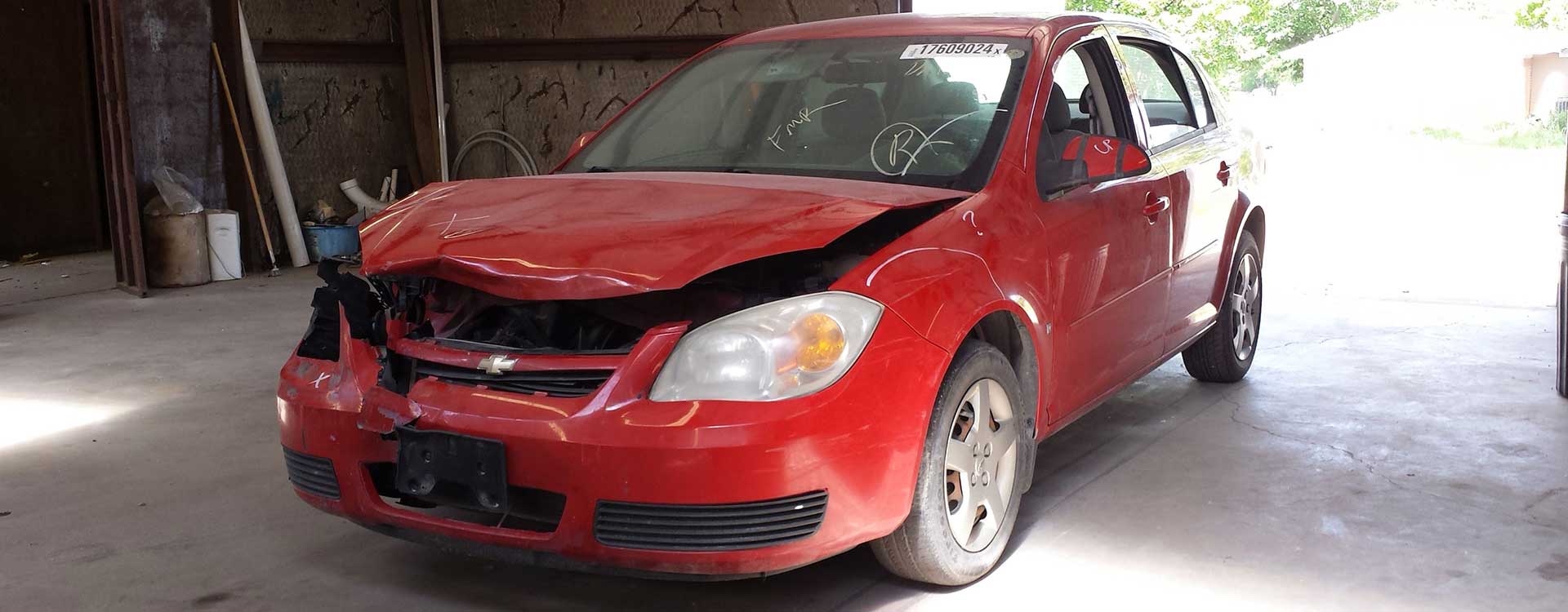Choosing a Donor Car
Building a DF Goblin requires a Chevrolet Cobalt donor car. The following guidelines cover the questions you must answer to choose your donor Cobalt.
Can I build a Goblin with a different donor?
The Chevrolet Cobalt and Pontiac G5 are the only compatible donor cars.
To make the Goblin very easy to assemble and to increase the feature set of the final product we've designed the kit to re-use as much from the donor as possible. This includes components like the subframe, suspension,brake components, pedal box, gauge panel, BCM and much more.
If you tried building a Goblin without a Cobalt, you would have to adapt the kit to the components from your donor car. You would run into issues using things like our front suspension uprights that bolt to the bearing hubs from the rear of the donor Cobalt or the remote brake fluid reservoir adapters that fit the Cobalt master cylinder and reservoir.
What year model?
The DF Goblin is designed to accept components from any year of the Chevrolet Cobalt.
2005-2006 Cobalt
424,118 unit produced
Pros
- Easy to find on Craigslist
- Least expensive donor years
Cons
- Higher mileage
- Least horsepower (145 hp)
- No tire pressure monitoring
Important note: 05-06 2.2 Cobalts can't be tuned with HPTuners.
2007-2008 Cobalt
388,666 unit produced
Pros
- Easy to find on Copart or Insurance Auto Auctions, Inc
- Moderately priced
Cons
- No tire pressure monitoring
- No variable valve timing
2009-2010 Cobalt
202,100 unit produced
Pros
- Highest base model power (155 hp)
- Likely to have lower mileage
- Tire pressure monitoring
Cons
- Harder to find
- More expensive than older donors
Which Cobalt trim?
Any Cobalt trim will work with the Goblin kit
Base Model
Years
2005 to 2010
Horsepower
145 to 155
Transmission
Auto or Man
0-60 time
4.7 s
Aftermarket turbo or supercharger can be bolted on for up to approximately 200 wheel horsepower.
Sport and SS/NA
Years
2006 to 2008
Horsepower
171 to 173
Transmission
Auto or Man
0-60 time
4.45 s (est)
Aftermarket turbo or supercharger can be bolted on for up to approximately 225 wheel horsepower.
SS/Supercharged
Years
2005 to 2007
Horsepower
205
Transmission
Manual
0-60 time
3.7 s
The SS/SC bottom end is the strongest stock bottom end. Check out LSJ-T swaps to see whats possible (500+ whp).
SS/Turbocharged
Years
2008 to 2010
Horsepower
260
Transmission
Manual
0-60 time
3.25 s (est)
SS/TC cars are the hardest to find but provide the best stock performance.
How many miles?
It is tricky to judge a donor based on mileage, but we suggest staying under 150,000 miles.
Running and driving or wrecked?
You can get a good deal on a donor by finding one that has been wrecked but it is always safer to buy a running and driving donor.
Follow these guidelines when buying a wrecked donor.
Since you won’t be using the body, cosmetic damage is fine. In fact, severe cosmetic damage (like a car that has been rolled-over) makes it tough for someone to resell a Cobalt for a profit, so you should be able to get a good price.
Structural damage needs to be looked at more closely. If the damage is to the roof, doors or rear, the donor will likely be okay. However, watch out for extreme damage to the front.
On any donor, make sure the following pieces are not damaged (for a complete list, see this document: Detailed Donor Parts List ):
Subframe - The subframe supports the engine, transmission, and control arms. It must not be bent or crushed in anyway. Look along the tubes of the subframe for any wrinkles or creases that suggest the tubes are bent.
Engine and Transmission - If at all possible, try to hear the engine run before purchasing the donor. Some of the online auctions don’t give this option so you have to assume the risk.
Intake manifold - In a front collision, the plastic intake manifold and throttle body can be crushed. Check to make sure neither is damaged.
Control arms - Make sure the control arms are not bent. A good indication of a bent control arm is a wrinkle or crease in the metal. If the top and bottom of the arm are flat, the arm is probably straight.
Steering knuckles - Make sure the aluminum steering knuckles are not broken.
Struts - The struts need to be straight. Look for any damage to the tube on the outside of the strut. Also, make sure the strut has not been torn from the aluminum steering knuckle. There should be two bolts holding it to the knuckle.
Gauge panel - To get the most out of the donor Cobalt’s info system, we urge you to use the stock Cobalt gauges. If you want to use the panel, make sure the gauges are not busted. If possible, get power to the car and turn on the key to check the gauges.
Turn signal lever - To control the turn signals and headlights, the Goblin reuses the Cobalt turn signal switch. Make sure it is not broken.
Seats - During a collision, the seats can be damaged. If you plan to reuse the seats, make sure the recline and slider adjustments still work. There are some great seat covers online that fit the Cobalt seats nicely so don’t worry too much about the condition of the upholstery.
Seatbelts - If the car was wrecked hard enough, explosive canisters in the belt mechanism could have fired. If so, the belt will not pull out or retract and you’ll be unable to reuse them. The Goblin requires the driver and front passenger belts.
Electrical System - The Goblin uses the bulk of the electrical system from the donor car. Do not buy a car with flood damage.
